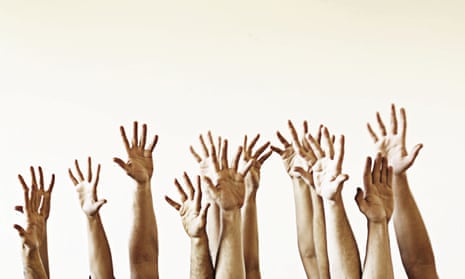What is the point of clapping? Sitting in the packed overspill hall at Conservative party conference this week, watching Theresa May do her thing via a screen rather than live in person, the surprising thing was that people still clapped, even though they must have known the speaker couldn’t actually hear them. They might as well have been screaming into the void, or sitting in stony silence. But so deeply ingrained is the habit that this ghostly audience still reacted exactly as it would have done in the hall: dutiful smatterings of applause where they know they’re meant to show approval, more enthusiastic spanking of hands for the bits they actually like. There’s something curiously satisfying about applauding things that move us, so much so that trying to stop yourself feels awkward and frustrating.
Ironically, that’s roughly how some autistic people also feel about flapping their hands, or rocking back and forwards, or other so-called stimming behaviours that may come out when excited, or anxious, or overwhelmed by noise and lights and stimuli. The difference is that clapping is thoroughly acceptable in polite society and stimming isn’t, so some autistic people spend a great deal of energy trying to suppress the urge in a way that must feel pretty awkward and frustrating too. And it’s this question of who should be accommodating whom – how far it’s up to neurological square pegs to cram themselves into the round holes provided, and how far it’s up to the rest of us to make more generous allowances – that is at the heart of an otherwise rather madly overblown argument about clapping.
When the National Union of Students announced some years ago that it would rather people expressed approval at its events by waving their hands about, supposedly to avoid distressing autistic students or those who can’t handle loud noises, I admit I thought it was ridiculous. But this week, when Manchester students also voted to encourage what’s become known as jazz hands (although strictly speaking the hand-waving is a sign language signal used by the deaf), I found I’d changed my mind. If Generation Z can at times be solicitous of other people’s feelings to a fault, then in the week that the US president publicly mocked a woman’s testimony of sexual assault, frankly I’ll take excessive kindness over cruelty any day. The idea is not itself above criticism. Given the countless sensory challenges presented by universities crammed full of overexuberant people who have just left home, clapping may not come terribly high on the list of obstacles to inclusion. And while it turns out that one reason “jazz hands” caught on is that for many autistic people flapping your hands to show emotion feels innately satisfying, for some a sea of waving hands could be as overwhelming a stimulus as a barrage of noise. There’s no solution that suits everyone.
That’s presumably not why the health secretary, Matt Hancock, declared that banning clapping would be “bonkers”, however. For its critics, this is yet more proof that Generation Snowflake is composed of ridiculously sensitive little flowers who will never cope in the real world, what with their trigger warnings and their “safe spaces” and their no-platforming Germaine Greer, and who urgently need to get a grip.
But like this week’s other silly argument, over the journalist Julia Hartley-Brewer filming herself shouting “boo!” from inside the Labour party conference’s “safe space” (basically a glorified cupboard with some chairs in it), it confuses genuinely troubling free speech issues with what are essentially questions of manners.
Banning Hartley-Brewer from next year’s conference is frankly an overreaction from a party that would be better employed making its Jewish MPs feel safe walking around without police protection. But getting annoyed by physical “safe spaces” is overreacting too, in a different way. Obviously, shutting down serious debate on challenging ideas by claiming the mere idea of a discussion violates someone’s emotional “safe space” is wrong. But providing a quiet physical bolthole for anxiety sufferers wanting to ward off a full-blown panic attack, or autistic people feeling a bit overwhelmed in a noisy and crowded place, is a kind, practical gesture that at best meets a need and at worst does nobody any harm. It may seem a bit worthy and unnecessary to people who didn’t grow up with it, but doubtless the same was once said of providing creches and baby-changing spaces in the loos.
And if it feels as if the pendulum is being pushed too far towards inclusivity and tolerance, it’s worth first remembering that student politicians have been pushing things too far since time immemorial; and, second, considering the alternative. Within living memory, in Britain, gay people were being advised to “cure” themselves by getting married, Jewish immigrants to change their surnames, black women to straighten their hair and lighten their skins, and clever women to forget about unbecomingly masculine careers and concentrate on motherhood.
We have been forcing square pegs into round holes for generations, in some cases causing untold pain and misery and in others something closer to exhaustion. It is debilitating to struggle constantly to “fit in” with a ridiculously narrow social norm, to grow up knowing that your mind just doesn’t seem to work in the way other people’s seemingly does or that what comes naturally to you is deemed wildly embarrassing – and saddest of all is that it’s often unnecessary given a bit of goodwill on all sides. If those in Generation Z want to try erring more heavily on the side of kindness, then they probably deserve a more considered response than mass sniggering from the cheap seats.

